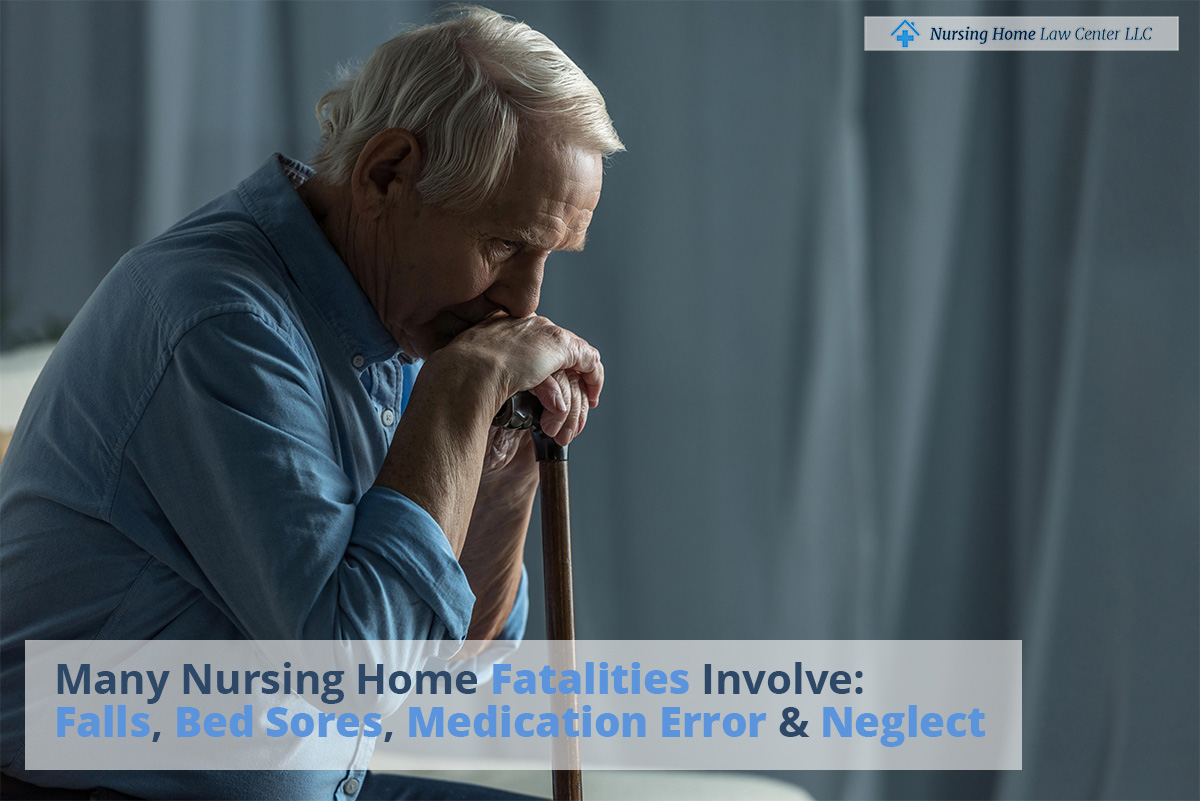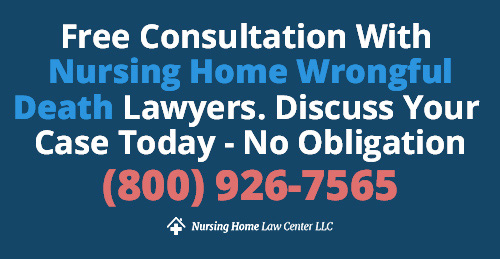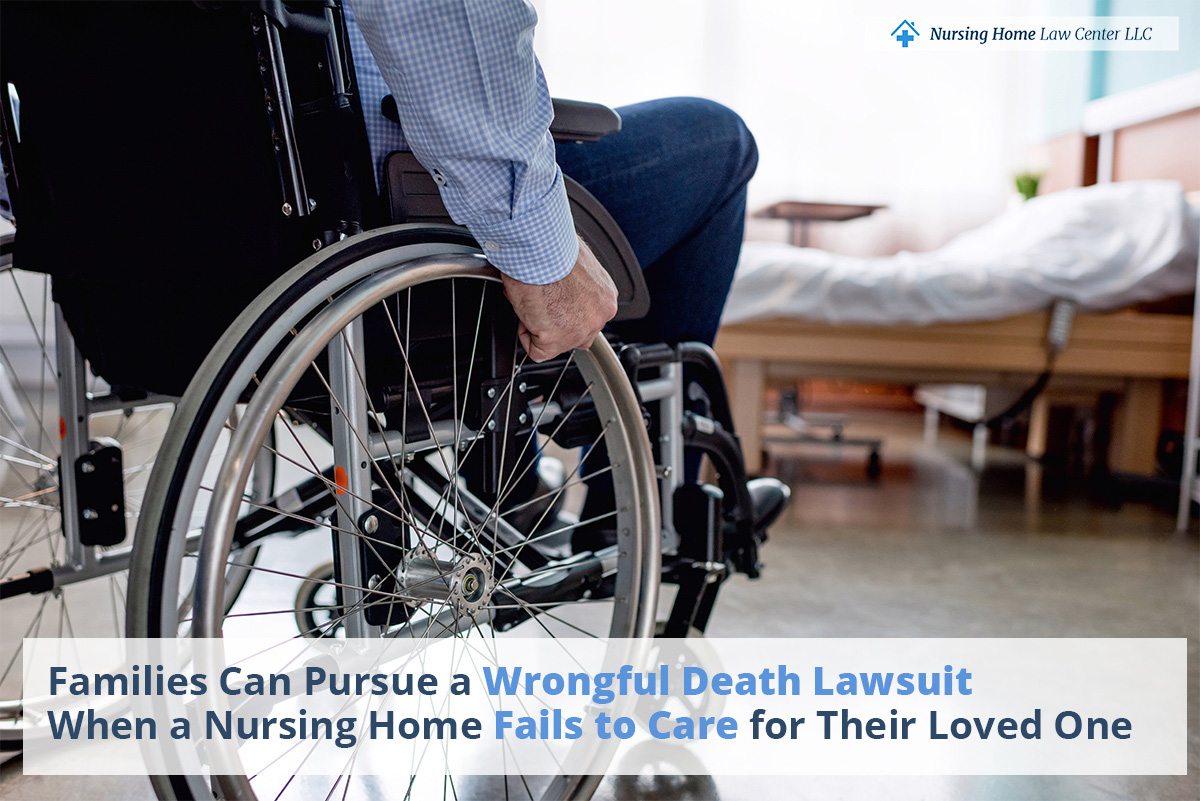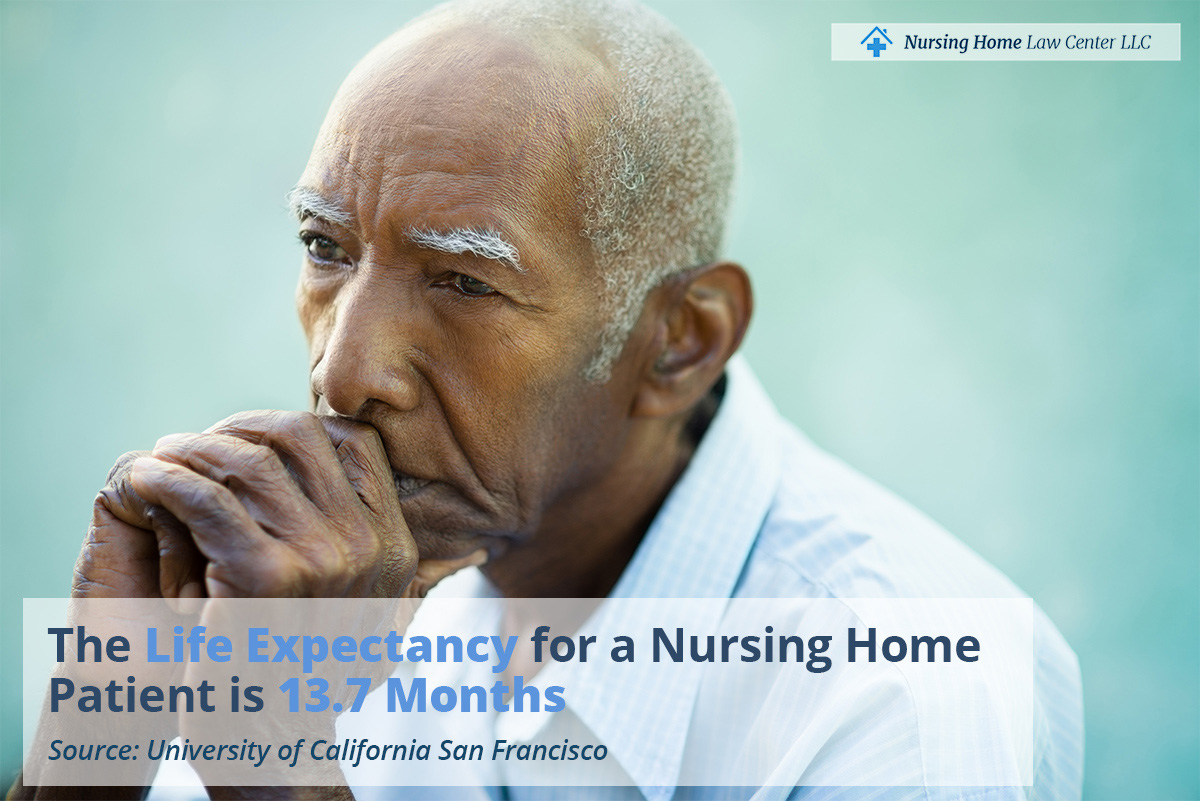legal resources necessary to hold negligent facilities accountable.
Nursing Home Wrongful Death
Families move their loved ones into nursing homes to receive the care they need to thrive and live comfortably. Unfortunately, some nursing home residents become victims of abuse and neglect, and instead of enjoying a high quality of life in their later years, they suffer an untimely death.
A wrongful death occurs when a nursing home resident dies due to negligence. In other words, the residents would still be alive if they had not suffered abuse and neglect.
Did you lose a loved one due to a nursing home's negligence? If so, the personal injury attorneys at Nursing Home Law Center, LLC can help you seek the justice your family deserves.
We guide victims' families through nursing home wrongful death cases so they can receive financial compensation and, more importantly, hold negligent parties accountable for their actions.
Contact our nursing home abuse lawyers at (800) 926-7565 for a free consultation. All sensitive or confidential information you share with our legal team remains private under an attorney-client relationship.

A wrongful death lawsuit is a legal action brought by family members and legal dependents against individuals whose negligence caused the death of a person. The plaintiff can bring a suit against the defendant facing criminal charges for the same incident.
Even if the defendant is found not guilty of the criminal charge against them, a nursing home lawsuit may hold them liable for the deceased's family's damages.

A wrongful death lawsuit is usually caused by a facility's failure to provide proper care to a resident or protect them from avoidable harm. Many nursing home wrongful death cases arise from:
- Slip-and-Falls: Falls are potentially disastrous for residents, who are mainly elderly individuals. Fatal nursing home falls can occur while a patient gets out of bed, gets in and out of the shower, traverses the stairs, etc.
- Infections: Nursing home patients spend most of their time in close contact with staff and other residents, which is one of the reasons why infections can spread rapidly in nursing facilities.
- Medication Errors: A medication error occurs when a nursing home prescribes or dispenses the wrong drug or administers a drug incorrectly. While most medication errors don't cause severe consequences, others can lead to significant drug-to-drug or drug-to-food interactions that increase the risk of death in a vulnerable patient.
- Inadequate Medical Care: Most residents enter nursing homes or assisted living facilities with pre-existing conditions like diabetes and heart disease. Without a proper care plan, these residents' illnesses may progress faster and lead to nursing home wrongful death.
- Malnutrition and Dehydration: Nursing home neglect (failing to provide basic needs) can lead to malnutrition and dehydration.
- Assault: Some residents become victims of physical assault from staff members or other patients. A nursing home wrongful death can occur if the assault leads to significant injuries, especially to the head.

Nursing facilities are legally obligated to protect residents from avoidable harm, especially untimely deaths. Sadly, not all nursing home facilities meet this responsibility, allowing wrongful deaths to occur.
The following forms of nursing home abuse and neglect most frequently lead to wrongful death and a subsequent wrongful death lawsuit:
- Inadequate Supervision: Nursing home employees must supervise residents frequently to prevent accidents, such as falls and choking.
- Poor Medical Response: Failure to provide prompt medical treatment can lead to a wrongful death in the nursing home. For instance, patients suffering from bedsores may develop sepsis if they don't receive immediate care.
- Lack of Infection Prevention: Every nursing home must have infection prevention protocols to prevent spreading potentially fatal diseases among residents. Otherwise, outbreaks are more likely to occur, increasing the risk of tragic death, especially among the most vulnerable patients.
- Inadequate Fall Prevention: Many nursing home wrongful death cases involve fall accidents resulting from a lack of fall prevention measures. A caregiving home and assisted living facility must protect patients from falls by securing beds, installing handrails, clearing debris, fixing faulty steps, evaluating fall risk, etc.
- Nursing Home Abuse: A caregiving home must enforce rules and precautionary measures to prevent resident-on-resident violence.
A loved one's death is always devastating, and your immediate family deserves compensation for such an avoidable tragedy. While no amount of money will take away the pain of losing a family member, recovering compensation from a wrongful death claim can help ease the financial burden on your family.
Who Can File a Wrongful Death Lawsuit?In all 50 states, surviving family members, including parents, children, and spouses, can file wrongful death cases. Some states allow distant family members, such as grandparents and cousins, to file a wrongful death case if no close relatives are available.
In some states, life partners, financial dependents, and common-law spouses can also file a wrongful death lawsuit. Non-relatives who suffer a financial loss due to the death may also be eligible, depending on which state the death occurred.
If a resident files a personal injury lawsuit but passes before it is resolved, their family can continue the suit on their behalf.
Who is Liable for a Nursing Home Wrongful Death?Liable parties in nursing home wrongful death cases may include:
- Nursing home staff members
- Visitors
- Other residents
Nursing facilities, the companies that own them, and their insurance providers will be liable in a wrongful death nursing home lawsuit, regardless of who is at fault. Their liability stems from failing to prevent a resident's death in a nursing home, a legal obligation under state and federal law.
What Evidence Do You Need to File a Wrongful Death Nursing Home Lawsuit?The most challenging part of filing a nursing home lawsuit is proving causation. To recover compensation, you must show that nursing home negligence led to your loved one's death, and it would not have happened if the facility did not act negligently.
A wrongful death nursing home lawyer will help you gather the evidence you need, such as:
- Medical records
- Facility records
- Autopsy reports
- Police reports
- Incident reports
- Surveillance footage, if available
- Witness accounts
- Expert testimony
- Photos of injuries
Families of deceased residents file wrongful death lawsuits to hold the nursing home financially responsible for the following losses:
- Medical Expenses: Nursing home wrongful death settlements usually include compensation for the deceased's medical bills before death, including expenses for emergency transportation, hospitalization, medication, surgery, etc.
- Funeral Costs: A victim's family could receive compensation for burial and funeral expenses or cremation costs.
- Lost Financial Support: The deceased resident would have provided compensation for money to family members, if applicable.
- Lost Inheritance: Money or assets the deceased resident would have given to heirs as an inheritance.
- Pain and Suffering: Financial compensation for the physical or mental harm the deceased suffered from the moment of the underlying incident to the time of death.
- Loss of Consortium: Compensation for loss of companionship or emotional support, usually awarded to a spouse or immediate family.
- Family's Pain and Suffering: In some states, families can pursue compensation for the mental pain and suffering caused by their loved one's wrongful death.
- Punitive Damages: The court may award punitive damages to your nursing home wrongful death case to punish the defendant for gross negligence and deter similar behavior in the future.
Your nursing home abuse lawyer will help you identify all your losses during your free case evaluation.
What is the Time Limit for Filing a Nursing Home Wrongful Death Claim?The statute of limitations for wrongful death cases varies by state. In most states, you have less than three years from your loved one's death to file a claim, while others allow filing up to five years.
File a wrongful death lawsuit as soon as possible to avoid missing the deadline. Otherwise, you may be unable to file a claim and receive compensation for funeral expenses, medical bills, and other losses.

Wrongful death settlements range from $500,000 to several million dollars. It is difficult to pinpoint a more precise range, as no two wrongful death cases are identical. Your settlement will depend on your case's circumstances, the victim's age, the level of nursing home abuse involved, and other factors.
However, the extent of your damages (e.g., funeral expenses, medical bills, etc.) significantly impacts your case. Your elder abuse lawyer will calculate the value of your settlement to give you an idea of how much your family deserves.

It takes a skilled legal expert to tackle a wrongful death case against an institution like a nursing home and its insurance company. While a lawyer is not required to file a wrongful death lawsuit, having one can make the process easier.
Our nursing home wrongful death lawyers will:
- Investigate the circumstances of your loved one's passing
- Establish the facility's negligence, e.g., the nursing home's failure to protect your loved one from abuse or intentional harm
- Collect documents to support your claim, such as medical records and autopsy reports
- Interview nursing home staff members, visitors, and other residents
- Consult with elder abuse and other nursing home wrongful death attorneys
- Submit a nursing home abuse case on your behalf
- Negotiate a fair settlement value
- File a wrongful death nursing home lawsuit and represent you in court, if necessary
Aside from helping you recover compensation for funeral costs, hospital bills, and other losses, having a nursing home abuse lawyer take over your case will allow surviving family members to grieve in peace.
You don't need the burden of a nursing home lawsuit during this difficult time; our attorneys are more than willing to shoulder it for you.
Schedule a Consultation with Our Nursing Home Wrongful Death LawyersEvery nursing home facility is responsible for preventing accidents, injuries, and illnesses that could lead to death in a negligent facility. A wrongful death may occur if a facility fails to avoid hazards or meet a resident's health care requirements.
If you lost a loved one in a nursing facility due to negligence, you could file a nursing home wrongful death lawsuit to receive financial compensation for your family's damages. The nursing home abuse lawyers at Nursing Home Law Center, LLC help victims' families file wrongful death cases and fight for their right to fair settlements.
Our experienced personal injury attorneys have extensive experience in handling all kinds of nursing home wrongful death cases, including nursing home abuse, slip-and-falls, medical malpractice, etc.
Contact our wrongful death nursing home attorneys at (800) 926-7565 or use the contact form for a free consultation. All confidential or sensitive information you share with our legal team remains private under an attorney-client relationship.
Our attorneys handle all accepted nursing home wrongful death cases on a contingency fee basis.
Resources:
